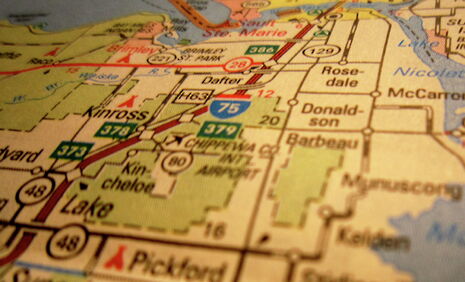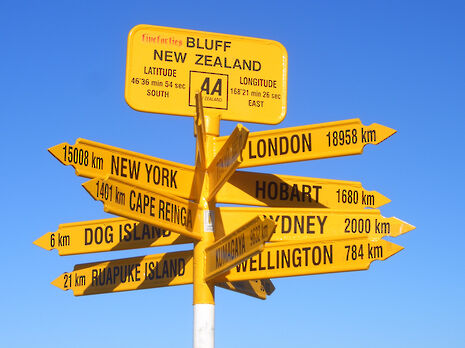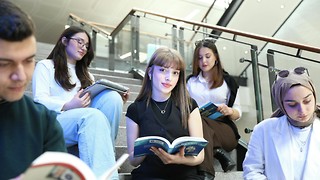Technology has turned us into culture addicts
Polly Evans looks at how flights at the click of a button bring into focus our desperation for culture

In the early 19th century the invention of the steam engine revolutionised travel, allowing people to traverse the country in a matter of hours rather than days or weeks. This altered life so dramatically that time itself changed as a result, and local times became synchronised according to Railway time. Britons found themselves able to leave their small villages and enter into a larger, European community. Brexit aside, perhaps 21st-century technologies are the modern steam engine equivalent – the ability not only fly to different countries across the world but to do so at the click of a finger has made the world a smaller and more interconnected place. Tools like Eurostar Snap or Skyscanner enable us to make a snap decision to swing by Paris for the weekend or jet off to the Bahamas for the week. We can book a flight on our iPad, hop on an aeroplane, and one sleeping pill and a glass of red wine later we’ve woken up on the other side of the world, groggy and dislocated. All we have to do is move our watches forward and somehow, we’ve literally travelled through time.
The way that we can zip from one country to another in a few hours has messed with our spacial and cultural awareness. We are now able to experience another cultural landscape with speed and efficiency. Going on holiday nowadays has for many has changed from the simple desire to relax and take time out into a mission to find and absorb an ‘authentic’ cultural experience. We’ve become culture addicts, and technology promises to facilitate our cultural quick fixes. We can turn to blogs like Lonely Planet to help us wander ‘off the beaten track’ or urban exploration apps like ‘Dérive’ to help us get ‘lost’ in a city’ in ‘random unplanned way’. The idea that we might need help getting lost seems absurd to me, but the fact that tools like this exist point to our obsessive tendency to want to gain a ‘real’ cultural experience. A Forbes article from 2015 cites a study by Topdeck Travel that surveyed 31,000 people from 134 different countries found that 98 per cent of younger generations ranked ‘eating local cuisine’ as something that was very important when travelling. If you want to cut out the process of wondering past numerous restaurants until you find the right one, you can turn to apps like Zomato or Trip Advisor to do all the hard work for you.

It seems ironic that we might wish to turn inwards to our iPhones or other devices to help us find an external authentic experience, but statistics show that technologies aren’t just considered a useful aid to travelling, but are now integral to the process. In a study by New Horizons III that surveyed over 34,000 young travellers from 137 countries, they found that that ability to book using mobile devices is now the second biggest consideration after price.
“We are now able to experience another cultural landscape with speed and efficiency”
I experienced first hand how easy technology makes travelling when I went alone to Japan a couple of years ago. I would have been completely lost without it – I used Skyscanner to help me find the cheapest flight, Memrise to help me learn some basic words and phrases and Tabimoro to assist with everything from organising train times to general advice on ‘life and culture’, all of which made the process staggeringly easy. Would I not have been able to do the trip alone without my iPad? Of course I would have, but the difference probably would have been that I would have had to research my trip a whole lot more beforehand, and maybe spent a few months trying to learn a bit of the language first. In effect, I think I would have made more of an effort to properly engage with the culture of the country I was visiting.

There are of course many benefits to the way that technology facilitates experiencing another culture – sites like Airbnb encourage you to stay in other people’s houses rather than in internationally owned corporate hotels, bridging the gap between tourists and locals. Apps like these open doors directly into people’s homes, encouraging a type of travelling that is about sharing cultural values and experiences. There’s no point romanticising a lost age of travel in which everybody got lost all the time and ate horrible food, and obviously these technologies are designed to make our experience of travelling easier. They only start to seem absurd when they try to exploit our obsession with authenticity, and maybe this is something we need to work out. A glance at Britain’s colonial past reveals our long and troubling history of exploiting and commodifying cultures as we ‘explore’ the world, and so our obsession with capturing and recording facets of different cultures to bring back as tokens or evidence of our cultural experience should be treated with caution. Perhaps we should stop trying to locate the ‘authentic’ facets of another culture as a means of satisfying our own egotistical desire to broaden our cultural horizons, and try to enjoy another country through what it has to offer to us, not what we can take from it
 News / Cambridge bus strikes continue into new year16 January 2026
News / Cambridge bus strikes continue into new year16 January 2026 News / Local business in trademark battle with Uni over use of ‘Cambridge’17 January 2026
News / Local business in trademark battle with Uni over use of ‘Cambridge’17 January 2026 News / Uni members slam ‘totalitarian’ recommendation to stop vet course 15 January 2026
News / Uni members slam ‘totalitarian’ recommendation to stop vet course 15 January 2026 Interviews / The Cambridge Cupid: what’s the secret to a great date?14 January 2026
Interviews / The Cambridge Cupid: what’s the secret to a great date?14 January 2026 Science / Why smart students keep failing to quit smoking15 January 2026
Science / Why smart students keep failing to quit smoking15 January 2026









